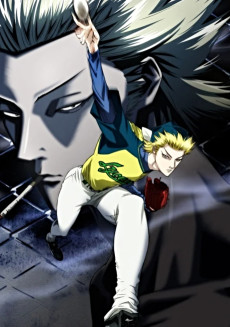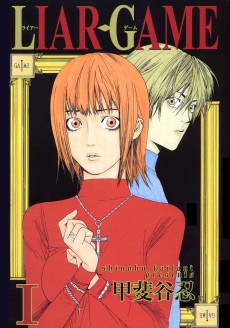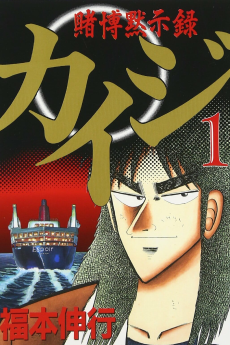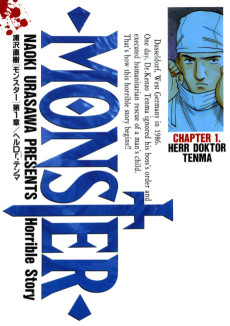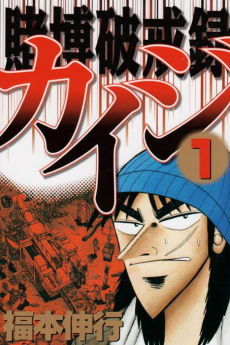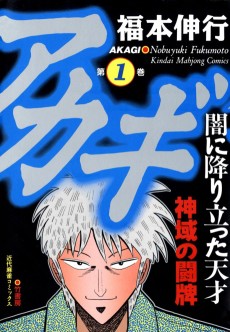ONE OUTS
STATUS
COMPLETE
VOLUMES
20
RELEASE
February 19, 2009
CHAPTERS
176
DESCRIPTION
The story begins when Hiromichi Kojima, the star batter of the fictional Lycaons in Japan's Pacific League, heads to the southern Japanese island of Okinawa to train and bring himself out of a slump. There, he meet Tōa Tokuchi, a 134-kmph (83 miles per hour) pitcher and the undisputed king of a gambling form of baseball called "One Out." At Kojima's urging, Tokuchi signs up with the Lycaons under an unusual contract: he gets 5,000,000 yen (about US$46,000) for every out he pitches, but loses 50,000,000 yen (US$460,000) for every point he gives up.
(Source: AnimeNewsNetwork)
Notes:
- The main story was completed in 168 chapters with 19 volumes on 2006-10-19. An additional side story Giwaku no All Star Sen Hen (疑惑のオールスター戦編) was serialized from 2008-2009 and published as volume 20 of the series.
- Chapter count includes an additional chapter included in the 7th volume.
CAST
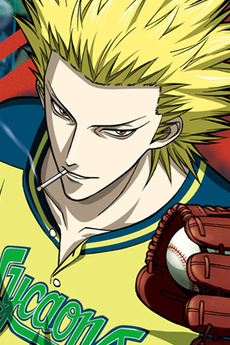
Toua Tokuchi
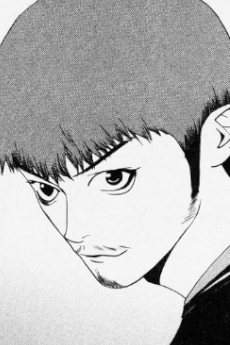
Satoshi Ideguchi
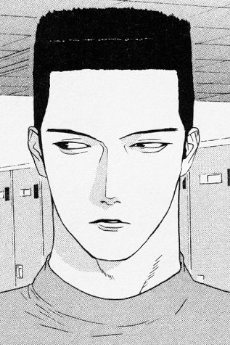
Hiromichi Kojima
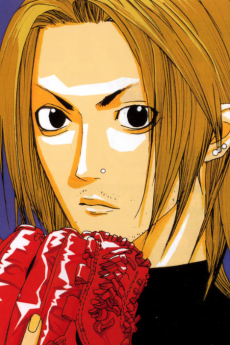
Itsuki Takami
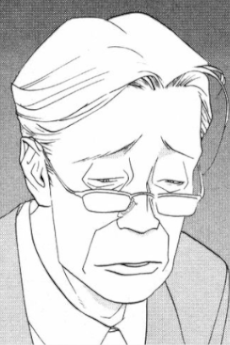
Mitsuo Oikawa
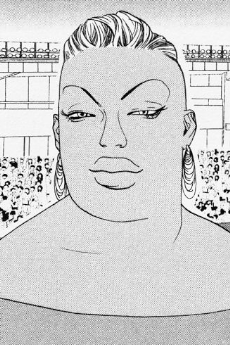
Big Mama

Dennis Johnson
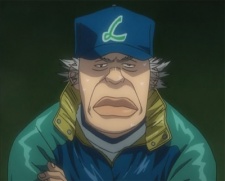
Yuuzaburou Mihara

Tsuneo Saikawa
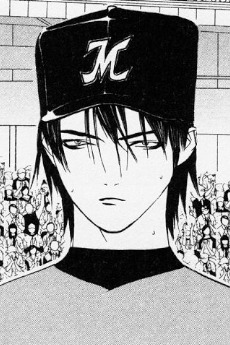
Junichi Kawanaka
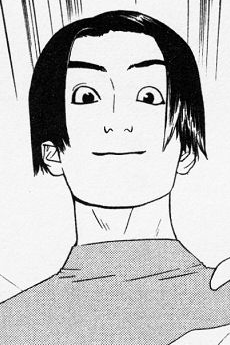
Imai
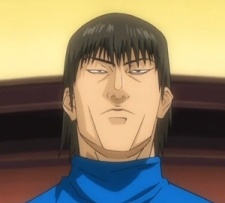
Yoshida
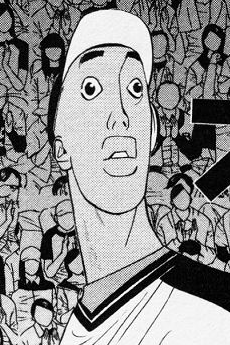
John Muruwaka
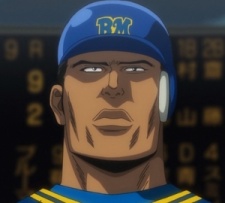
Pedro Rodrigo
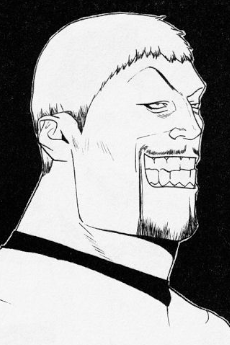
Brooklyn
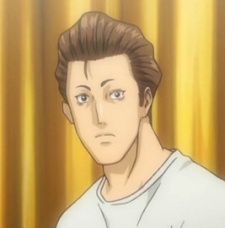
Nakane
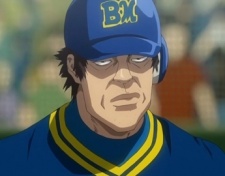
Kawabata
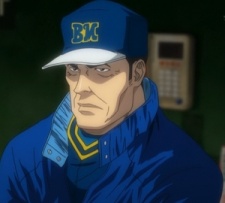
Tendou Tetsuji
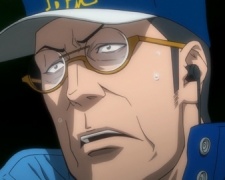
Takashi Shirooka
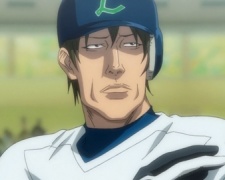
Arai
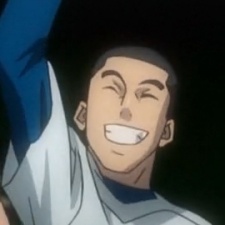
Nishimura
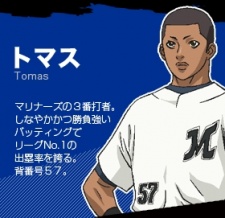
Tomas
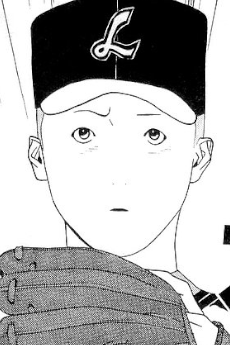
Hajime Kurai
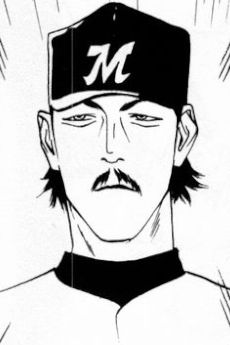
Kira
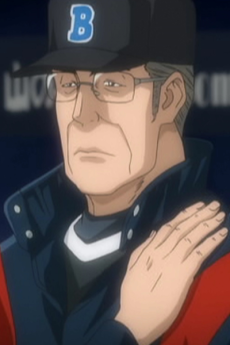
Katsurou Shirooka
CHAPTERS
RELATED TO ONE OUTS
REVIEWS

Cirruuss
95/100An absolute Homerun when it comes to Sports MangaContinue on AniList__One Outs, a Psychological Masterpiece__

General Thoughts:
One Outs is a Sports Manga that is alot different then other Sports Manga, It is about the Sport of Baseball but it differs in the aspect of how the manga displays this Sport and how it connects all to the Topic of Gambling. It isnt any get stronger and win more Series it is all about Making Money through the Game of Baseball while also Playing with the Human Mind.
Summary:
One Outs got its Name from the Game One Outs in which a Single Pitcher plays against a single Batter, if the Batter hits the Ball for a Fair Play he Wins if he gets a Strikeout though the Pitcher wins. When Hiromichi Kojima who is an Legend in the Baseball World of One Outs Trains on Okinawa for the Off-Season he gets involved in the Game of One Outs, even though he is a Professional he quickly Losses to an Gambler called Toua Tokuchi who won 499 Games of One Outs without Losing a Single One, Kojima returns after a Short period of self-doubt to take Tokuchi on one last time, after 2 Strikes from Tokuchi he manages to Hit and win against Tokuchi winning the bet of the Two, thus engaging the Story of One Outs. (If you wonder what that Bet was and why Kojima lost, read the Manga i try to keep this Review as Spoiler Free as Possible.)
The Psychological Aspect:
The Manga plays alot with Quirks of the Human Mind, you see how a Human can be Read easily through small Habits of theirs and how to Outplay them with their own strengths, The One who absolutly Perfected this Technique is Tokuchi the MC, while his Pitching is rather avarage his Trick Plays and His Technique are unrivaled by any Pitcher in the Entire Manga. He is a Pitcher so Strong he alone makes up some Wins at the Start of the Manga, but that isnt his Real Strength because his real Ability shows alot later which makes it feel like a Powerup until you realise this Power has been there the Whole Time, simply i can say Tokuchi as the Maincharacter and how he Plays the Game of Baseball and Manipulates everyone and everything around him is just so satisfying to read, and if you like that you should Give One Outs a Shot even though the Side Cast isnt really the Best.
The Artstyle:
One Outs is an Older Series from the Late 90's, this results in being a Manga which dosent have the Best Artstyle but it is a really Unique one which i really appreciated while reading. Some Examples:

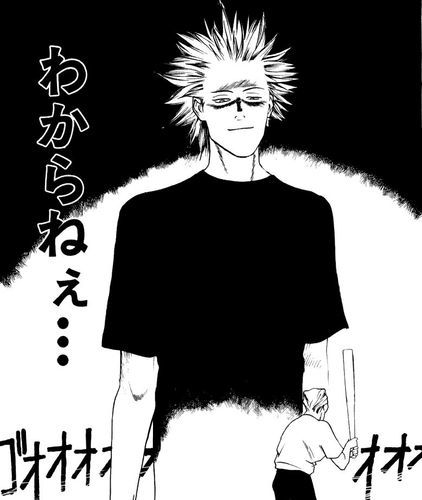


These are some what i would Call Normal Panels from the Manga, decide for yourself if you like it or not.
End Word:
One Outs is a great Manga and i hope that i could share my thoughts with you reading this, something i still want to say is that One Outs also has an Anime Adaptation which covers the First 82 Chapter of the 175 Chapters Total, since One Outs is an Older Series there is a Translation Gap sadly between Chapter 68-82 at the Current Time of writing this Review so i will advise you to Watch the last 5 Episodes of the Anime to know what happens, Or just watch the Anime and then Switch to the Manga anyways the Chapters slowly get Translated to my Knowledge so that we should have a Complete Translation in the Future. (And Sorry if i made any Errors in my Review in terms of Grammar Mistakes, English isnt my First Language i hope that you still enjoyed reading this though) Thanks alot for Reading my Review, hopefully you will give this amazing Manga a Shot now because it really is worth it. 
Rework7288
70/100Starts with a home run, but hits a slump in the later innings, and fails to save due to a rushed ending.Continue on AniListI really, really enjoyed the first half of this manga. Sports manga are hit-or-miss for me, but I love tense, psychological gambling manga (think Akagi, not Kakegurui), and the first hundred chapters or so really deliver on that front. But at roughly the two-thirds mark, the emphasis of the series changes. From that point on, the plot spins out of control, and the series loses a lot of what made it great. There was an arc towards the end that made me think the series might be finding its legs again, but ultimately it failed to fulfill that hope, and the ending was indefensibly rushed.
Background
The basic premise of the story is that Tokuchi is a brilliant pitcher, despite his lack of athletic ability, because of his incredible talent at reading and manipulating his opponents. This talent lets him turn an 80mph fastball, and no ability to throw breaking pitches, into an undefeated record in "One Outs"—a one-at-bat gambling game played between a pitcher and batter. A veteran slugger named Kojima persuades him to play for the Lycaons, a perennially bad team. Tokuchi negotiates an unusual contract (called the "One Outs" contract) with the Lycaons' owner, Saikawa: $50,000 for every out while he's pitching, but -$500,000 for every run, with a multiplier clause that allows Saikawa to increase the stakes in key games.
This contract gives rise to almost all of the tension and conflict in the first half of the story. We quickly learn that Saikawa has no interest in the Lycaons' performance as a team. He cares only about maximizing their profits, because he has a secret contract to sell the team for 10x that season's profits. And Tokuchi racks up millions of dollars in his first handful of games, which would ruin that plan. So rather than use Tokuchi's talents to the team's advantage, Saikawa (acting through the manager) tries to ensure that the team loses, or at least that runs are scored against the team while Tokuchi is pitching.
The Good
This leads to some fantastic moments early on in which Tokuchi is (for example) forced to pitch every inning of a tripleheader, or switched in only when the bases are loaded, or even targeted by dirty tricks on and off the baseball diamond. This conflict between the player and his own team's owner lets Tokuchi's almost supernatural strength as a pitcher and gamesman coexist with genuine tension and difficulty for the team. And as Tokuchi leads the team through those struggles, his aloof demeanor thaws slightly, his teammates begin to trust him, and the team starts to develop into a real contender for the league championship.
So for about the first half to two-thirds of the series, it was giving me everything I wanted in a sports manga. Tokuchi is a strong character who can stand the emphasis the series places on him. (In a lot of ways, including his appearance, he reminds me of Yoichi Hiruma, my favorite character from Eyeshield 21.) His development from an icy and aloof asshole into an icy and aloof asshole who cares about the team and has its respect is fun to watch—especially the growing bond of trust between him and his catcher, Ideguchi. The series is at its strongest, in fact, when Tokuchi is backed into a corner, his own abilities are stretched to their limits, and his mind games give his teammates an opportunity to use their own strengths for the first time.
The Bad
Unfortunately, a little after the halfway point, the shortcomings of this premise start to show. The premise has two major weaknesses that eventually start to hamper the series.
First, there is only so much that you can do with a pitcher who has one pitch. As I said, the idea was that Tokuchi has no real athletic ability but is able to strike out excellent batters with nothing but a slow fastball because of his ability to read his opponent and get inside their head. But as increasingly good batters go up against him, this would begin to be (a) implausible, because at some point reflexes and visual acuity alone should be good enough to hit an 80mph fastball, and (b) boring, because each at-bat would go essentially the same way. So to address that issue, Tokuchi's skills are retconned a little bit. I won't go into the details, but what it boils down to is that Tokuchi is preternaturally accurate and has two subtly-different pitches that he can choose between at the moment he releases the ball. Okay, that's fine—better, in fact, since it makes the story feel a bit more plausible. But as the series advances, and the conflicts broaden from "let's not allow any runs while I'm pitching" to "let's win the game" and so on, the physical component of Tokuchi's pitching gradually replaces the psychological component. By the end of the series, the one-on-one psychological battle that got me hooked has totally vanished.
Second, the nature of Tokuchi's contract makes his earnings spiral out of control, robbing the conflicts of much of their tension. (What follows contains spoilers of roughly the first half of the series.)
I mentioned earlier that Saikawa can multiply the contract rate during critical games. Of course, since he only cares about wiping out Tokuchi's earnings and preserving the team's profits, he uses this to try to make up his losses rather than to increase the importance of key games, but that's not really the issue. The problem is that there is no limit on Saikawa's ability to do this—and once Tokuchi comes out ahead despite a 20x multiplier, the 1x earnings don't seem to matter much. But neither do the 20x earnings, because there's no real reason Saikawa can't simply do 40x, or 80x, in an infinite cycle of "double of nothing" that makes the whole thing feel meaningless. Eventually it feels like Tokuchi is playing for Monopoly money.
In fact, this ultimately interferes with the plot, leading the series to completely neglect its strongest points, overturning some of its core themes, and ruining much of Tokuchi's character development. (What follows contains spoilers of the first 70–80% of the series.)
Eventually the numbers have become so ridiculous that there is really no way to continue the story with the original premise, and Saikawa is removed as head of the Saikawa group (and therefore as owner of the Lycaons) in large part due to the debt he incurred to pay Tokuchi. The Lycaons are promptly sold off and, in a totally unsurprising development, Tokuchi buys the team using his absurd winnings from the One Outs contract, allowing them to continue the season.
At this point the series goes totally off the rails. It turns out that Tokuchi—who, I will remind you, appears to have developed a genuine bond with his teammates—was engaged in a triple-cross, working with a private equity company to drive down the value of the Lycaons and force a sale only to betray them and buy it for himself at a bargain-basement price. This fact is revealed in a phone conversation between him and his teammates while they are together at practice and he is in bed with a blonde supermodel, which should give you some idea of how remorseful he feels about the whole thing.
Then there is a new antagonist introduced who appears to be trying to cause a merger of Japan's two baseball leagues. This subplot fizzles out almost immediately, but he continues to be the antagonist of the rest of the series.
Then Tokuchi completely overhauls the team's salary scheme, replacing it with a "you only get paid if we win, and only based on your individual performance" model. From this point onwards, the sense of camaraderie that had been built up during the first half of the series, the idea of shared striving, is totally out the window. I think the idea is to give Tokuchi's talents as a psychological manipulator a broader scope, but all it really does is make the Lycaons' final arc deeply unpleasant to read. The message ultimately sent by that arc is that the Lycaons had hidden strength that could only be unlocked once they stopped caring about the team as a whole and started focusing on making money. It's not a fun arc.
As the series lumbered on towards its conclusion, I still had some goodwill towards Tokuchi and his teammates, and I still wanted to see them achieve their goals. But the finale was a letdown, too. At about Chapter 155, it became obvious that the ending was going to be incredibly rushed. And it was.
Early in the series, it was normal for a single important game to get several chapters, and those were some of the best chapters of the whole series. The championship game, the finale, was decided in about twenty-five pages, and Tokuchi doesn't even play in it. To give you an idea of how rushed this ending was, at about Chapter 160, a returning character from Tokuchi's past said that she would stay in Tokyo until she saw Tokuchi hoisted victorious on the shoulders of his teammates. So, obviously, whatever else happens, surely we get a two-page spread of that moment of triumph, right? Nope. Nothing. The series ultimately ends with Tokuchi completely disappearing, doing an Irish goodbye at the championship victory OF THE TEAM HE OWNS. There is no payoff whatsoever for the character development that occurred. No moment of triumph. Nothing.
Ultimately, the direction One Outs goes during the second half of the series suggests that the author didn't understand his own protagonist, or at least didn't care about doing him justice. Tokuchi is distant, cold-blooded, and unreadable, but he also has a sense of whimsy and honor. At the beginning of the series, he chooses to treat Kojima as having won their "One Outs" match, and therefore chooses to join the Lycaons, because he is moved by Kojima's determination. He chooses to make Kojima's championship dream his own. The Tokuchi who does these things in the first half of the series is not the Tokuchi of the second half.
Conclusion
If you are able to appreciate the first 60% of this series for what it is, and accept it as the brilliant but incomplete story of an unconventional pitcher leading his team to victory through mind games and psychological warfare, you will really love One Outs. If, like me, you cannot do that, then I do not think you will like One Outs, and I can't recommend it to you.

Biisoo
90/100Enter Tokuchi Toua, One of the most cunning characters in ani/manga ever.Continue on AniListI'll start off by saying that this is a criminally under-popular manga even though it belongs in the sports genre and generally sports anime/manga are more on the popular side. I've personally never seen or cared for Baseball and the only reason I decided to read this is because of two things.
- I found the name "One outs" extremely cool (I mean, it definitely is a cool name for a series)
- I was interested in the Main character.
Now on to the review,
Enter Tokuchi Toua, One of THE MOST cunning and psychotic protagonists I've ever seen in anime/manga. I'll put him right up there alongwith Madara Uchiha, Johan Liebert and Sosuke Aizen. It wouldn't be an exaggeration to say that Tokuchi literally carries this whole manga. The entire manga is based around mind games and high stakes stuff which gets so complex and abysmal that at times you'll go back and re-read paragraphs just to confirm the insanity of what the author is planning. I wont spoil anything but how the author has managed to make a clever yet resonably realistic protagonist is deserving of praise. He is crazy and he basically makes a fool out of everyone all while chilling (That's an accurate description for the protagonist lol).
The art for this manga is probably the only negatives or the aspects which I wasnt a fan of. It certainly does its job and conveys emotions but at times it really feels lacking which is unfortunate because as clever as the manga is and the rest of the stuff the art is actually not that great but it does the job. It does get better as the story progresses though.
All in all, This is a manga that makes you rack your brain for stuff and excites you and at times even subverts your expectations as to what will happen, before the protagonist does something outlandish and fools you the reader.
Keep in mind, the main highlight of this manga is the Clever protagonist and mind games, high stakes stuff. Baseball is just an added bonus.
Personally I'm a real fan of stuff that makes you actively think and engage so this was very enjoyable for me (even though I'm not that smart). Sometimes stuff gets overly complex and it surprisingly involves a lot of maths lol (I hate maths, but the author dumbs down his explanations to make them easier to understand aswell).
If you're a fan of baseball then you can check this out but it truly shines in the psychological stuff so if you're a fan of that then you'll love this. It was an enjoyable and worthwhile read and Tokuchu Toua has no doubt become a part of my ever-growing list of all time favourite characters.Even if you dont know a thing about baseball, like me then you'll actually end up learning alot about it like how I did and its actually really educative and clever.
This manga taught me an important lesson that its better to work smarter rather than just working harder which one can apply in their life aswell.
It isn't a masterpiece but its pretty damn good, 9/10.
Thanks for reading, Have a cookie ?
SIMILAR MANGAS YOU MAY LIKE
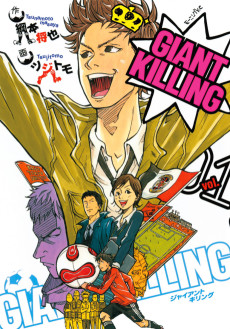 MANGA ComedyGIANT KILLING
MANGA ComedyGIANT KILLING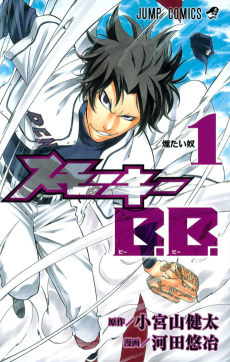 MANGA SportsSmoky B.B.
MANGA SportsSmoky B.B.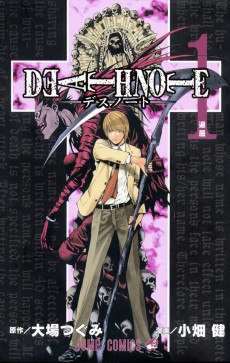 MANGA DramaDEATH NOTE
MANGA DramaDEATH NOTE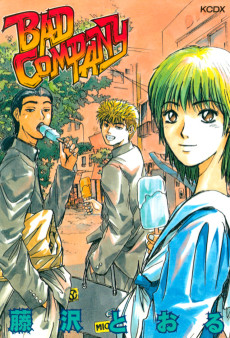 MANGA ActionBAD COMPANY
MANGA ActionBAD COMPANY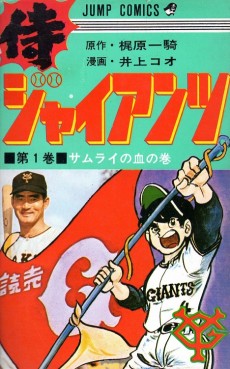 MANGA ActionSamurai Giants
MANGA ActionSamurai Giants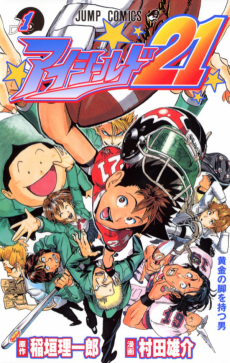 MANGA ComedyEyeshield 21
MANGA ComedyEyeshield 21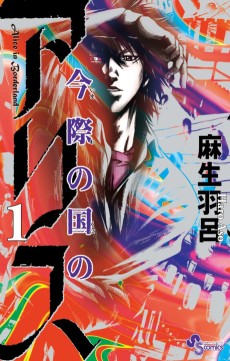 MANGA ActionImawa no Kuni no Alice
MANGA ActionImawa no Kuni no Alice
SCORE
- (4.15/5)
MORE INFO
Ended inFebruary 19, 2009
Trending Level 1
Favorited by 437 Users


